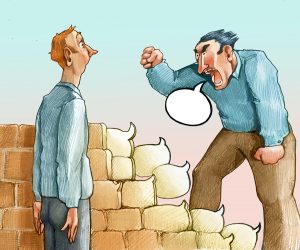Breaking the Habit of Profanity in the Workplace
 I was concerned primarily with profanity. Moments before my first on-air shift at a radio station I confessed my desperate nervousness to my Program Director. “I am scared about saying the wrong thing!” I professed. “What if suddenly I accidentally let a cuss word out or something?”
I was concerned primarily with profanity. Moments before my first on-air shift at a radio station I confessed my desperate nervousness to my Program Director. “I am scared about saying the wrong thing!” I professed. “What if suddenly I accidentally let a cuss word out or something?”
My PD assured me “You should be worried. It’s exactly the right attitude to have. The FCC doesn’t take that well!”
At the time, the Federal Communications Commission, who oversees broadcast media, had very strict rules about the use of profanity on the radio waves. A fine for the station and even for you personally was not completely out of the question, depending on severity and frequency.
“I knew that the profanity used up and down my street would not go over the air..so I trained myself to say ‘Holy Cow!’ instead. –Harry Caray, famous Chicago Cubs announcer
Our Words Make a Difference
I don’t remember the Program Director’s talk making me feel any better. I did manage to get through my few years in broadcast radio without letting a swear word slip out on-air. And there was another benefit to his little “pep talk” – it made my very aware of how language and the words we use make a difference.
Therefore, I want to encourage you to restrict the use of profanity overall – in the workplace, at home, in the community. Despite it’s prolific use today in the movies, television, and so forth, it still has a very negative aspect to it.
“All hockey players are bilingual – they speak both English and profanity.” -Gordie Howe
Here are some other reasons profanity doesn’t help
1. It’s Unprofessional
A study conducted by CareerBuilder.com found that 81% of employers believed swearing (profanity) brings an employee’s professionalism into question. A good 64% said it caused them to think less of the employee. Being a professional by its nature demands a certain level of self-control that profanity belies.
2. Words Have Impact
You know the old adage we used to say to the mean kids when we were young. You know,
“Sticks and stones may break my bones, but names will never hurt me!”
Well, it’s a lie. Study after study has repeatedly shown that it DOES hurt us. Deeply. We might laugh it off as though we are too tough for anything like that to affect us, but it does.
The truth is that there is evidence according to authors Andrew Newberg, M.D. and Mark Robert Waldman that words can literally change your brain. They suggest that just seeing a list of negative words makes you feel worse and disrupts many of the operational centers of your brain. Other research suggests it also changes the attitudes and behaviors of others.
Negative words, therefore, will trigger negative behaviors – not just in others but in ourselves as well.
3. Words Have Emotion
Words alone have minimal impact. It is the emotional context we put behind words that gives or takes away impact. Curse words by design have negative impact and so there is not really a way to say them with a positive impact. Some will try to say positive things that include profanity but the intent will diminish.
Think about it. If someone compliments you by saying “You F—in’ Rock!” does it really make it more positive than to just say “You Rock!“? In fact, if you look at it, the use of the profanity actually lessens the impact rather than enhances it. You focus on the F—in’ and not the rockin’.
4. It Desensitizes
The more profanity is used the less impact it has. On the surface that sounds like a good thing. Great! Curse up a storm and it eventually won’t bother anyone anymore!
Yet it also means it won’t have the impact you intended it to have. While there are some that curse as part of their second nature, overall we use curse words precisely for the impact they have; either to stress the emotions of your words or to intimidate or just to show power.
However, it’s like taking drugs. At first a little has effect but then after a while it takes more and more to have the effect we want.
5. It Impedes Communication
 When people react negatively to curse words, their impulse is to defend. When they are defensive, they are no longer open to truly hearing what you have to say. Their response will almost always be a negative one; whether they become openly aggressive or opt for a more passive-aggressive stance. Either way, while the use of profanity triggers emotional response, unless your intent is simply to intimidate or cause emotional reaction you won’t reach your communication goals.
When people react negatively to curse words, their impulse is to defend. When they are defensive, they are no longer open to truly hearing what you have to say. Their response will almost always be a negative one; whether they become openly aggressive or opt for a more passive-aggressive stance. Either way, while the use of profanity triggers emotional response, unless your intent is simply to intimidate or cause emotional reaction you won’t reach your communication goals.
6. You Could Be Fired
While you do have freedom of speech guaranteed by the Amendment One of the U.S. Constitution, the Supreme Court of the United States also defined a category of exceptions they called Unprotected Speech. Part of the exceptions are many of the curse words we use. They are considered obscene and inflammatory and therefore are not protected by the First Amendment. It falls in the same realm as fraudulent speech or defamation.
Can be Beneficial
That all being said, most of do curse at least on occasion, me included. For those of who do once in awhile let loose with an expletive or two (or three) are actually finding a little bit of pain release, whether physical or emotional. A study reported at PsychCentral.com actually found it provides an outlet for pent-up emotions. We are less likely to to become violent when we let loose with a few profanities and can actually improve our well-being.
The same study, however, did find that high frequency diminished any of the positive effects. So if you are going to use curse words, be careful of how much and how often.
“Under certain circumstances, urgent circumstances, desperate circumstances, profanity provides a relief denied even to prayer.” -Mark Twain
So intent matters. Overall, remember that profanity is pretty much meant for negative and not positive impact. Choose the words you say and when you say them for optimal positive impact.
